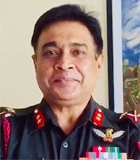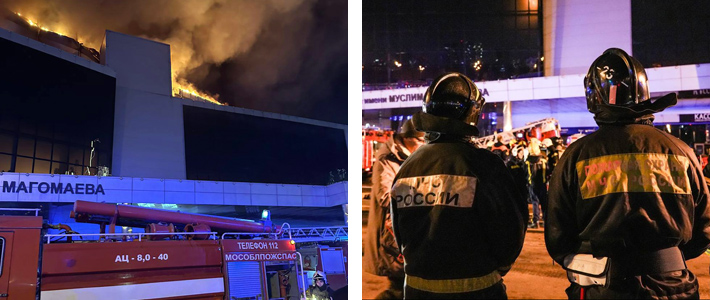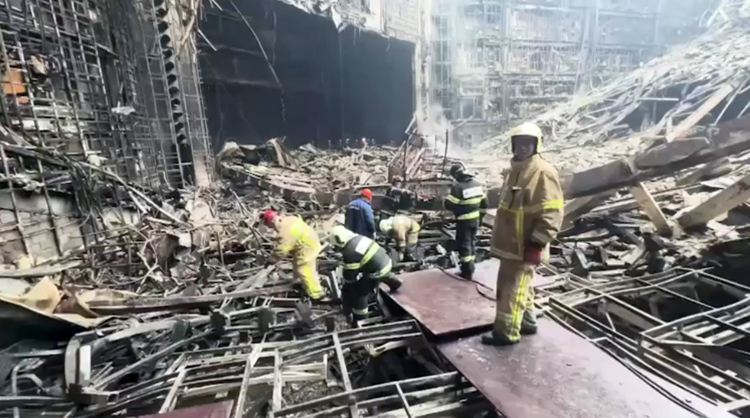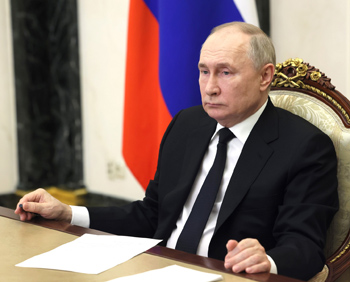INDIAN ARMED FORCES CHIEFS ON OUR RELENTLESS AND FOCUSED PUBLISHING EFFORTS

The insightful articles, inspiring narrations and analytical perspectives presented by the Editorial Team, establish an alluring connect with the reader. My compliments and best wishes to SP Guide Publications.

"Over the past 60 years, the growth of SP Guide Publications has mirrored the rising stature of Indian Navy. Its well-researched and informative magazines on Defence and Aerospace sector have served to shape an educated opinion of our military personnel, policy makers and the public alike. I wish SP's Publication team continued success, fair winds and following seas in all future endeavour!"

Since, its inception in 1964, SP Guide Publications has consistently demonstrated commitment to high-quality journalism in the aerospace and defence sectors, earning a well-deserved reputation as Asia's largest media house in this domain. I wish SP Guide Publications continued success in its pursuit of excellence.
- Prime Minister Modi Visits Punjab’s Adampur Air Base, Interacts with Airmen after Successful ‘Operation Sindoor’; Stern Message to Pakistan
- The layered Air Defence systems that worked superbly, the key element of Operation Sindoor
- Operation Sindoor | Day 2 DGMOs Briefing
- Operation Sindoor: Resolute yet Restrained
- India's Operation Sindoor Sends a Clear Message to Terror and the World – ‘ZERO TOLERANCE’
- Japan and India set forth a defence cooperation consultancy framework, talks on tank and jet engines
Mayhem in Moscow
The Moscow terror attack reflects an intricate interplay of tangled global power dynamics
 |
The Author is former Chief of Staff of a frontline Corps in the North East and a former helicopter pilot. He earlier headed the China & neighbourhood desk at the Defence Intelligence Agency. He retired in July 2020 and held the appointment of Addl DG Information Systems at Army HQ. |


On the penultimate Friday of March, an eyeball grabbing terror attack on a suburban Moscow concert hall killed at least 139 people, injured another 500 and left the sprawling venue a smouldering ruin with a collapsed roof. An US intelligence official told The Associated Press that its agencies had confirmed that the Islamic State's affiliate in Afghanistan, known as ISIS-Khorasan or ISIS-K, was responsible. As if on cue, the ISIS claimed responsibility in a statement posted on affiliated social media channels. The style had typical ISIS imprint.
Questioning the Narrative and Examining Allegations

However, Russian President Putin, in a condolence address the next day claimed links to Ukraine and vowed a resolute response. Many questions have been thrown up from this gruesome incident. The four suspects of Tajik origins were stopped in the Bryansk region of western Russia, "not far from the border with Ukraine," Russia's Investigative Committee said. They planned to cross the border into Ukraine and "had contacts" there, as per Russia's Federal Security Service (FSB).
The speed with which the western media, led by feeds from the US intelligence, were able to precisely pin the perpetrators is simply perplexing. This is so because a much more spectacular attack in September 26, 2022 on the Nord Stream pipeline, a joint Russo-German vital infrastructure project under the Baltic Sea, that was just about to get commissioned but for the war in Ukraine, is still surrounded in mystery. This is despite the fact that the keenness of the US to make Nord Stream non-operational is in public domain. "If Russia invades, that means tanks or troops crossing the border of Ukraine, then there will be no longer a Nord Stream 2." Biden had said that, "We will bring an end to it. I promise you, we will be able to do it", during a press conference on February 7, 2022, a good seven months before the incident.
The speed with which the western media, led by feeds from the US intelligence, were able to precisely pin the perpetrators is simply perplexing
Pulitzer Prize-winning investigative journalist Seymour Hersh has published a story alleging that the United States was behind the sabotage of the Nord Stream pipeline system last year. According to Hersh, who published the story on his new Substack, the September attack on the Russia-to-Germany gas pipelines was carried out by the US Navy "under the cover of a widely publicised mid-summer NATO exercise known as BALTOPS 22" and with the help of the Norwegian Navy and Secret Service. The motive was quite clear. America's political fears were that Germany and the rest of Western Europe would become addicted to low-cost natural gas supplied by Russia, while diminishing European reliance on America.
Use of Terror as a Weapon
Using terror and radical terrorist organisations to score geopolitical goals has gained ascendency in recent years. States have international obligations even though some follow them only in the breach. On the other hand, non-state actors, many nurtured over the years by intelligence agencies of rival power blocks, have no such constraints, or territorial limits. They are known to step in for a price, becoming useful to their mentors and delivering missions.
The head of Russia's FSB security service, Alexander Bortnikov, has stated that, "We believe the action was prepared both by the radical Islamists themselves and, obviously, facilitated by Western special services. Ukraine's special services themselves have a direct connection to this."
Using terror and radical terrorist organisations to score geopolitical goals has gained ascendency in recent years
Sceptics will seriously doubt what the Russian FSB puts out, the west having demonised Putin and pushed Russian media out of all possible platforms. It is nearly impossible to know what's the version of the other side, save a Putin interview with Tucker Carlson early last month. But readers must question why they must believe what the CIA puts out, in the backdrop of their specular lies about the presence of WMDs in the run-up to invasion of Iraq in 2003.
Returning to theme of terrorist groups and their increased footprints in global geopolitics, Indian are by now well familiar with how the deep state in Pakistan, namely the ISI, has been breeding and facilitating terror groups in the past three decades. The accusations of Russia are plausible given our experience of the Mumbai terror attack of 2008 which, while being pinned on to Lashkar-e-Taiba, was directed, coordinated, facilitated with intelligence and logistics by Pakistan.
The accusations of Russia are plausible given our experience of the Mumbai terror attack of 2008 which, while being pinned on to Lashkar-e-Taiba, was directed, coordinated, facilitated with intelligence and logistics by Pakistan
Operation Cyclone was the code name for the CIA programme to arm and finance the Afghan mujahedeen, the forbearers of Taliban from 1979 to 1992, prior to and during the military intervention by the USSR. The mujahedeen were also supported by Britain's MI6, who conducted their own separate covert actions. It wasn't, therefore, surprising that the fountainhead of terror, Pakistan was designated by the US as its 'frontline ally in the GWOT'.
Combatting Extremism
In Africa's Sahel region, Mali, Niger and Burkina Faso, which have undergone military coups in the past three years and ousted French troops from their soil, accuse the former colonial power of tacit understanding with radical Jihadists to justify its troops presence and interfere in their nations' affairs. Replacing the French, the Russian paramilitary group Wagner has established itself in Mali, becoming the target of operations by jihadist groups.
The Moscow attack may have been purposed to bring the Ukraine war into the heart of Russia
Russia has been fighting radical groups for long in Chechnya since the nineties. Specifically, it has been in cross-hairs of ISIS ever since it intervened muscularly in Syria to save the Assad regime in 2011 during the Arab Spring uprisings. Assad, an Alawite (a Shia derivative), has battled the ISIS, an ultra-orthodox Sunni off-shoot of Al Qaida in its north-eastern region where the later had briefly established a Caliphate. Russia has its Naval base in Tartus that is vital for its operations in the Mediterranean as the Black Sea fleet can be blockaded by Turkey, a NATO member, at the Bosporus. In October 2015, a bomb planted by the ISIS downed a Russian passenger plane over Sinai, killing all 224 people on board, most of them Russian vacation-goers returning from Egypt.
The Moscow attack may have been purposed to bring the Ukraine war into the heart of Russia. Ukraine has also frequently targeted the Zaporizhia nuclear facility and the Kerch bridge to Crimea, a critical artery connecting Russia with its troops fighting in southern Ukraine to escalate to a level which may draw NATO to join the war. The window for such an escalation maybe be rapidly closing. The US Presidential elections in November is widely expected to see the return of Donald Trump, a known Putin ally and NATO naysayer.





